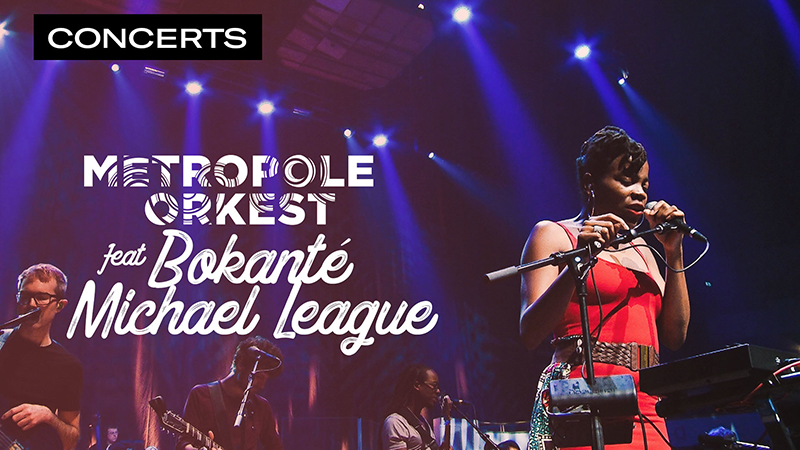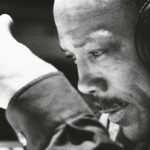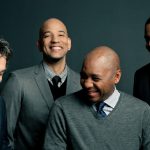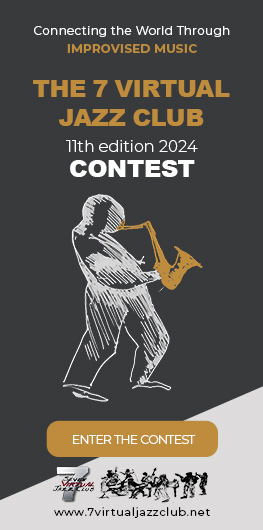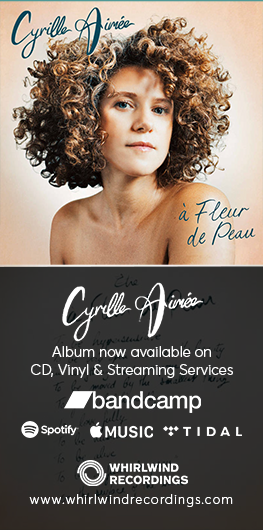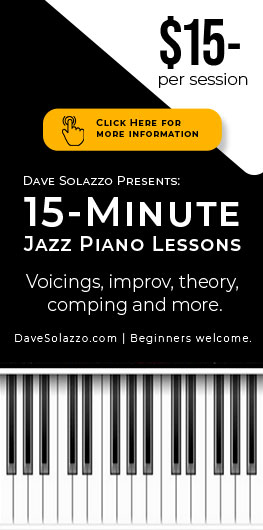Willy Kokolo: So what is appealing to you about Spain, culturally speaking?
Michael League: Well there is no Donald Trump to start with! I love the quality of life. I am a workaholic, so to be in a country where people are generally not workaholics is a good thing for me. To live in a place where there is a slower pace of life, where people eat for a long time, where things happen in a more relaxed way: it’s good for me because I can be very much the other way.
Willy Kokolo: Do you mind a provocative question, now that you are based in Spain …
Michael League: …Provoke me!
Willy Kokolo: What do you think of Rosalía? Obviously, she blends many different styles in her music while being faithful to the Spanish tradition of flamenco, but at the same time, she has been critically acclaimed and ventured into the mainstream. I know you have been vocal against mainstream music, trying to promote so-called “good music.”
Michael League: I was a fan of Rosalía years before “Malamente.” I think she has an unbelievable voice, she is an incredible musician, and as a human being, I really love her. Whenever a person like her does something like she did, which is to take a very sacred form of music and mix it with other things, people get upset. And I think it is healthy that people get upset because it makes people think. If Camarón [editor’s note: Camarón de la Isla] is the principal figure in flamenco, what was it like when he made his first record? Was everyone like “Oh yes this is what flamenco is?” Or were people like “What the hell is this?” It is interesting to think about how people feel about music, artists, evolution, sacrilege, heresy, and purity. All these concepts are all very subjective. And we are still like that! There are a lot of jazz musicians that think that what we are doing is disrespectful.
Willy Kokolo: But there is also a tendency to blend genres, with a lot of bands coming up in the jazz scene incorporating elements of hip hop, for instance.
Michael League: Yes, but here is the thing with Rosalía: a lot of the people who are going to complain about her are going to get a lot more gigs because of her! She is putting flamenco music back in people’s minds. And I am sure that there are people who think that Snarky Puppy is not jazz. And I don’t think it is jazz to be perfectly honest. Those people might think that it is sacrilegious or impure. But there are many people who have started to listen to Coleman Hawkins, John Coltrane, Miles Davis, and Herbie Hancock, that had never heard of those people before because they listen to the Robert Glasper Experiment, or Esperanza Spalding, or Snarky Puppy, or Roy Hargrove’s RH Factor. We need to understand that something we don’t like might actually help musicians and music.
Willy Kokolo: Speaking of culture, I am intrigued by your obsession with rhythm. It’s not that surprising because you’re a bass player so the rhythm section matters to you. Still, the detail-oriented attention you have and the fact that you have been learning Turkish percussion … where does it come from?
Michael League: I think a lot of musicians are frustrated drummers! I had a moment in Turkey when we played there for the first time and this Däf [editor’s note: a Turkish drum] ensemble called Defjen played Shofukan [editor’s note: from 2014 We Like It Here album]. And after the gig that night, we went to the rehearsal studio and they gave us all Däf lessons. I had this deep cathartic moment when I realized that this was part of my musical mind that I had never developed. So I started studying Däf, and then I started studying Dohola [editor’s note: a Turkish darbuka], and then I went to Andalusia last week and took a couple of lessons and now I am practicing Cajon. I don’t play any of this stuff really well, but it really strengthens me as a musician, making my sense of time better and my sense of rhythm stronger, as well as my understanding of what is going on behind the drums. Because understanding what other people are doing on other instruments is important. Other than that it has been very spiritual, and it’s very healing in a physical way as well to play percussion. Once you start playing instruments that are so resonant and tactile, your body needs to move a certain way to create a good sound and you start to develop a very unique relationship with them and with yourself. It’s something that I had never experienced before.

Watch Metropole Orkest feat Bokanté, Michael League on Qwest TV!

Willy Kokolo: Another interesting aspect of percussion is that you have a wide diversity of instruments coming from different cultures. Whereas most instruments in jazz come …
Michael League: … from the US.
Willy Kokolo: Exactly, so there is an element of open-mindedness when you decide to play percussion instruments. And here comes another provocative question!
Michael League: Provoke me!
Willy Kokolo: How did you become so open-minded growing up as a white guy in the US?
Michael League: (Laughs) You fucking racist! I’ve thought about that a lot. In the US people have an interest for things that are foreign at first, but at the end of the day they are proud of being Americans and that’s what matters most. Me personally, I am not that way and I think it is because my family moved every four years. So, I was born in Long Beach, California, then I moved to Alabama, then to Virginia, and then to Texas and to New York. Over the last ten years, I’ve spent 6 to 7 years outside of the US, too. For me, it would be a little weird to be closed because my natural state has been to always be moving. When I moved to Virginia from Alabama everyone made fun of my accent from the South. I don’t think I ever felt like I belonged anywhere.
Willy Kokolo: That is surely reflected in your music, which is a good thing. Taking into consideration those differences and that kind of cultural acceptance, how do you avoid cultural appropriation? Let’s take the example of Essaouira to be more specific since it had a strong impact on Immigrance.
Michael League: The first thing to understanding what sounds good. You have to understand what you are capable of and what you aren’t capable of. If you practice one instrument regularly, you will learn the technique and how to have a good sound. The thing that is not easy to learn is how to make it feel Moroccan. And if you listen to a very modern Gnawa group like Innov Gnawa who is based in New York, and then you listen to Hamid el Kasri, you hear two completely different kinds of swing, but it is the same rhythm and the same meter on the same instrument. I am never going to be able to sound like those guys, so I need to develop my own way of playing, the same rhythm with my own feelings, in a way that is not trying to be that thing. So the short answer to your question is about understanding what sounds good. It is also very important to develop a relationship that is only your own with the instrument, or with the thing that you have taken from that culture. I just use foreign elements as a starting place, and then I allow myself to get distracted by my own ideas, and I go further down that path. For instance, there is a call-in “Xavi” [editor’s note: the first song released from Immigrance] towards the end of the song that comes from something we did with Hamid el Kasri in Essaouira, but it is a common rhythm.
Right, it’s the same. So basically you need to be respectful of the tradition, and you need to take the time to study the tradition as well. I have gone to Morocco four times now, taking guembri [editor’s note: a Gnawa string instrument] lessons, hanging out every night with gnawi and trying to get the thing in me. I think you need to give it respect. And that applies to every culture. Sometimes we hear Europeans or Asians playing stuff that is from the United States, but it doesn’t feel like they are doing something of their own with it. It feels like they heard Chris Dave play one time, and they just try to emulate it without trying to be themselves. And I don’t want Moroccans to feel that when we play. It is not about the thing you are doing, it is about how you do it. Going back to the Rosalía conversation, when people try to have debates about it, they all just talk about what it is, rather than how it is done. Because the truth is if something feels awesome, it doesn’t really matter what it is.
Willy Kokolo: Apart from Moroccan music, what other influences did you want to showcase on Immigrance?
Michael League: “Even Us” is obvious I guess – that is Turkish for sure, although the melody to me sounds like Piazzolla. But the harmony is so weird, it’s very much my thing. “Chonks” is a straight-up funk tune. It is interesting since a lot of the guys in the band didn’t start playing funk until they were teenagers, they grew up listening to Nirvana, especially white guys.
Willy Kokolo: And you can still hear it, can’t you? Obviously there is a huge element of funk in many tracks, but in my opinion, there are also hints of progressive rock.
Michael League: I am not a progressive rock fan! And I am not actually a fusion fan. But I also understand why people think of Snarky Puppy as a fusion band, because fusion as a genre was just fusing different genres, and that is what we are all doing. But for me, a lot of fusion feels very athletic and virtuosic, and Snarky Puppy takes neither of those approaches. Most of the guys in the band are virtuosic, but that is not what matters. What we are trying to do is groove and play nice melodies, creating a rhythmic dialogue between each other. And to me, that’s more of a jazz/funk thing. I just feel like the progressive rock thing also comes from the instrumentation that we have. For instance the guitar line at the end of “Chonks,” to me that’s Jimi Hendrix. But when you have three guitar players playing it and synths, it sounds like progressive rock. I would say that this record is heavier, that there is more rock, like groove-rock or industrial rock, but not progressive rock.
Willy Kokolo: Can you explain the cover art of the album? I understand the concept of fluidity and how things get displaced, but why the fish?
Michael League: So Zeycan Alki? is a Turkish artist, whom I am a big fan of, and she is very provocative – she makes protest art. There is a lot to protest right now in Turkey, and she is always using it as inspiration for what she does. That fish to me, it is abstract, but it symbolizes what an immigrant does when arriving in a new country. Because you have the fishbone, which is the actual person, and then you have the skin. And the eye and the bones stay while the old skin leaves … then the fish goes on to take a new skin. But it will probably take a long time before it gets a new skin, it’s just bones for a while because it is a difficult thing to leave where you are from and to just start over in a new place. For me that image summarizes what it means to leave your former self, being vulnerable and naked.
Willy Kokolo: Those human and social considerations you just expressed are also found within your work for the GroundUp label and festival. You often describe yourself as a curator trying to help other musicians and promote new talents. How does this work?
Michael League: I feel like there are enough festivals that hire bands that are popular. So I feel the mission of our festival is to hire bands that no one knows really and to rely on the trust that people will have in our decision when we select bands. During the festival, we alternate between the two stages, so that you can see every second. Actually, people don’t have another option! And, what I noticed is that actually, the bands who get the strongest responses are not the ones who are the most popular; they are the ones who put on the best show. I remember Paris_Monster last year, or La Perla this year, or C4 Trio: no one had heard of them, and people were going insane! For me, this was a really good sign, because it showed that the audience wasn’t just coming to see their band play their favourite songs. They were really coming open-minded. So I wanna go further in this direction. Eventually, I don’t even want to announce any artists. And also we want to keep the festival small, at 2000 people a day, so it puts less pressure on us. We don’t have to hire George Benson and spend our entire festival budget on one artist. We can have 10 artists that you have never heard of that are equally amazing.
Willy Kokolo: Celebrity comes at a price indeed. And coming back to the membership of the collective, do you still get in touch with the people who have left, for instance, Cory Henry?
Michael League: Of course! Actually, the whole band went to his gig last week in Los Angeles. The same goes with Sput [editors note: Robert Searight, former drummer of the band]. We’ve probably had thirty to forty members, you know! I love the band, but it is an unfair expectation that every single person stays forever. I never felt like playing in another person’s band, I need my own thing. Everyone in our band has their own band, and that’s beautiful. This is why Snarky Puppy is the way that it is: it allows people to go. If Cory calls and says “Hey I wanna come back and play,” of course we’ll welcome him.
Willy Kokolo: If I wanted to apply to join Snarky Puppy, what would the job description look like?
Michael League: Well, there are no auditions! We know if a person would be right for the group, based on how they are as a person and as a musician. But if you want a criteria for that, I would say: selfless, generous, aware, a great listener, versatile, expressive, humble, someone who loves to just groove and doesn’t need to always be doing something super interesting, obviously someone who can play their instrument well. But really the most important traits are about personality and the capacity for conceptual ideas. Everyone in the band thinks like a producer, meaning “If I am producing this track right now, what would I have me do?”, even if the answer is “nothing, don’t play.”
This article was first published by Qwest TV in March 2019.
Last modified: April 25, 2020



